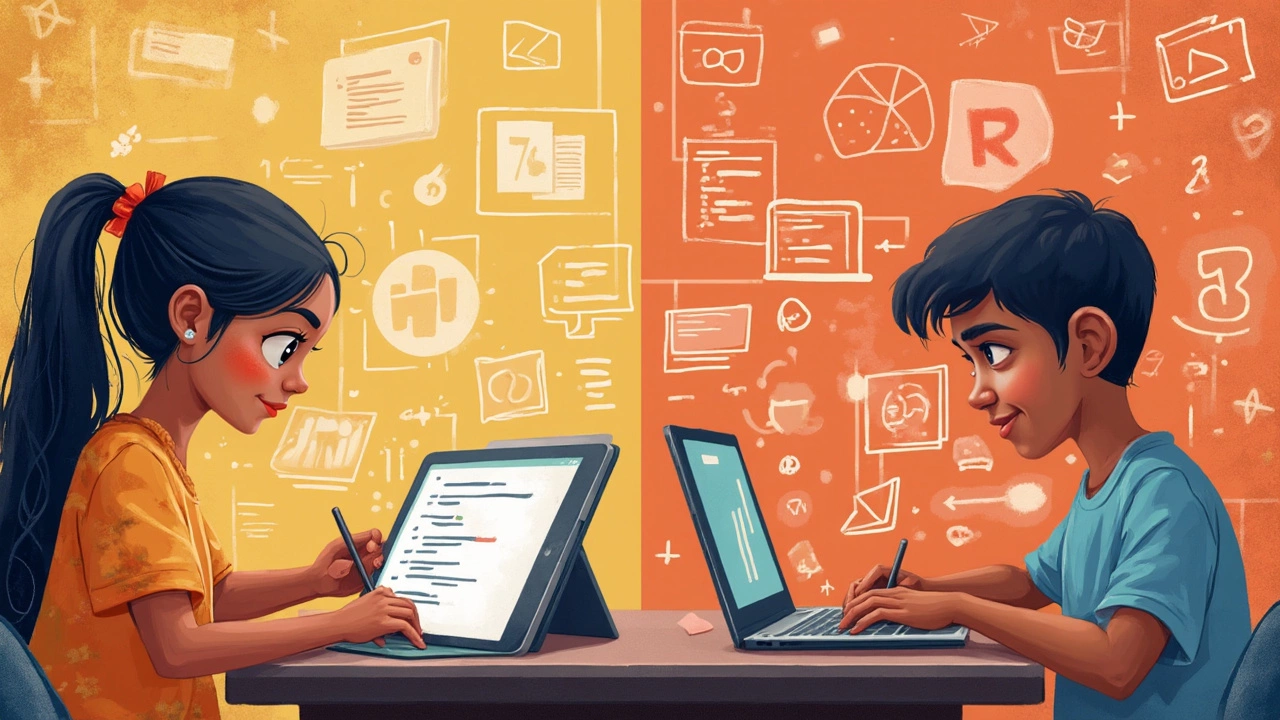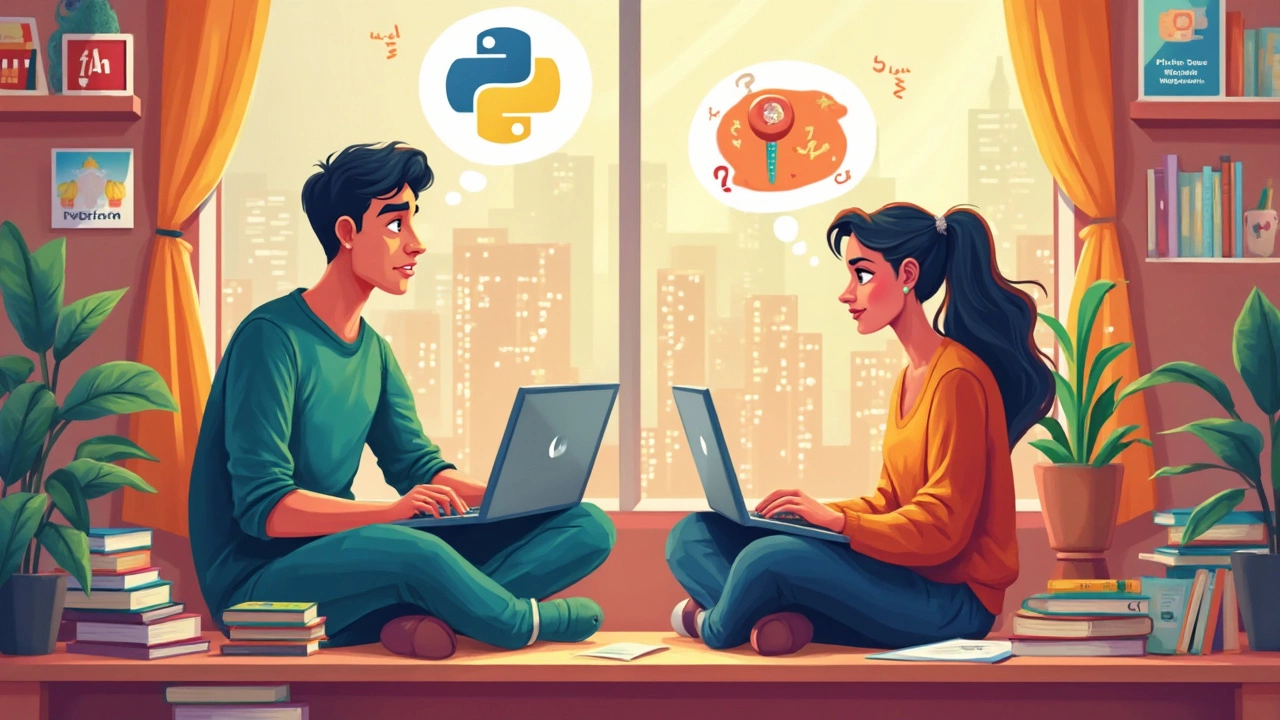Feeling stuck trying to pick your very first coding language? You’re not alone. Most folks freeze up at this step, worried they’ll waste months on the “wrong” choice. Here’s the blunt truth: you can’t really screw this up, but picking a language that matches what you want to build can save you a bunch of headaches.
If you’re aiming for the fastest way to build real stuff—like simple games, websites, or automations—some languages make life a lot easier from day one. You don’t need to know every option out there or memorize dry charts; what matters is getting your hands dirty with code that actually makes sense to you.
Turns out, most pros started with a language they found fun or accessible—not because it was the “coolest” or hardest. Don’t get caught up in trying to impress people. The tech world changes fast, but basics like logic, structure, and problem-solving stick with you no matter what. Ready to see which coding language fits your style?
- Why Picking the Right Language Matters
- Python: The Go-To for Beginners
- JavaScript: The Web’s Power Player
- Other Languages That Might Catch Your Eye
- Final Tips Before You Start Coding
Why Picking the Right Language Matters
Choosing the right coding language as your starting point isn’t about hype—it’s about making your first steps smoother and less confusing. Some languages feel like a maze to beginners, while others guide you through like a friendly IKEA map. Your goals matter here. Want to make websites? JavaScript runs the show in browsers. Interested in data or automation? Python is everywhere, from Netflix’s recommendations to Instagram’s backend.
The difference isn’t just about what you can build—it’s also about learning curves and job prospects. According to Stack Overflow’s 2024 Developer Survey, over 65% of professional developers say their first language played a big role in how fast they moved forward in tech. Trying to cram C++ or Java as a total beginner? That’s possible, but it’ll be a tougher ride. Languages like Python minimize roadblocks because they read more like regular English.
Here’s a quick look at what beginners report most often about their language choices:
| Language | Learning Difficulty | Main Use | Popular Starter? |
|---|---|---|---|
| Python | Easy | Web, Data, Automation | Yes |
| JavaScript | Medium | Web Apps, Websites | Yes |
| Java | Medium-Hard | Apps, Android | Sometimes |
| C++ | Hard | Games, Systems | No |
This isn’t about cutting corners. Getting comfortable early means you’ll stick with it long enough to actually see results. When learning is less frustrating, more people stay motivated and finish their first projects. That’s what separates folks who “try coding” from those who actually level up and get paid for it.
So, before you chase whatever’s trending, figure out what you want to build and how much upfront struggle you can handle. Tech doesn’t reward masochists—it rewards people who finish what they start.
Python: The Go-To for Beginners
If you ask around, you’ll hear the same answer over and over: Python is where tons of folks start, and for good reason. It’s easy to read, feels more like regular English than other coding languages, and you don’t have to wrestle with mountains of confusing code just to get something working. That’s huge when you’re just getting started and trying not to get discouraged.
The design of Python cuts out the extra junk. You don’t need curly braces everywhere or have to end every line with a blinking semicolon. Most intro coding classes pick Python because you can see results fast without banging your head against the wall. Even professional developers use it for serious stuff—from simple scripts to building entire apps and websites.
Here’s a quick table showing where Python lands compared to other popular languages in beginners’ classes and usage by job role:
| Language | Beginner Friendliness | Industry Use | Main Job Roles |
|---|---|---|---|
| Python | Very High | Data Analysis, Web, Automation | Analyst, Developer, Data Scientist |
| JavaScript | Medium | Web & Apps | Web Developer |
| Java | Medium | Enterprise, Android | App Developer |
| C++ | Low | Systems, Gaming | Game Dev, Engineer |
Here's something wild—not just beginners use Python. NASA, Netflix, and Google all rely on Python for tons of projects. That says a lot about how flexible (and powerful) it is. If you want quick wins—like building a calculator, scraping websites, or even tinkering with basic artificial intelligence—Python’s got your back. There are endless online tutorials, and the community is massive, so you’ll never have trouble finding help or examples.
Tip: When you hit a wall, search for Python solutions first. Chances are, someone else has asked your exact question—maybe a hundred times already.

JavaScript: The Web’s Power Player
Have you ever wondered how interactive buttons, cool pop-ups, or instant feedback forms work on your favorite websites? That’s usually JavaScript flexing its muscles. JavaScript is the coding language almost every site on the internet relies on for anything beyond basic text and images.
JavaScript started off in the mid-90s and just snowballed from there. Now, about 98% of all websites use it for their client-side scripts. That means if you want to actually make things happen on a web page—show a spinning loader, update data without reloading, or build chat apps—JavaScript is your tool.
- It runs in every major web browser (Chrome, Firefox, Edge, Safari) automatically, no extra installation needed.
- You can build both simple web pages and massive apps like Gmail or Netflix using JavaScript frameworks.
- If you’re interested in web development—front-end or even back-end—knowing JavaScript opens a ton of doors.
Let’s look at some fresh data. Here’s how JavaScript stacks up in terms of job demand and usage:
| Stat | Value |
|---|---|
| Most-used language (Stack Overflow 2024 survey) | Over 65% of professional developers |
| Websites using JavaScript | 98%+ |
| Popular JavaScript frameworks | React, Angular, Vue, Node.js |
One cool perk: JavaScript is the only mainstream language that works right inside your browser. Crack open your browser’s developer tools, and you can start playing with code instantly, no downloads or installs required. That makes it perfect if you like learning by doing.
Downsides? JavaScript can look a bit weird at first if you’re used to old-school math class syntax, and the web changes fast—frameworks and buzzwords pop up every month. Still, the basics haven’t changed much in years. Learn the core language and you’ll be set, no matter what new library comes along.
If you imagine yourself building websites, web apps, or even things like browser games, JavaScript is hard to beat for your first language. Bonus tip: many coding bootcamps and online courses now start with it for a reason. You’ll be able to show off real results fast, like interactive pages and simple web games, which keeps the learning process fun and motivating.
Other Languages That Might Catch Your Eye
If Python and JavaScript don’t seem like the right fit, there are plenty of other options—each with their own crowd of loyal fans. The truth is, certain languages play a huge part in industries like gaming, mobile apps, and big business software. Picking one depends on what you want to create and where you see yourself working down the line.
Let’s do a quick rundown of some popular names you’ll bump into:
- Java: This is the backbone of Android apps and huge enterprise systems. It pops up a lot in tech job postings. Java’s a bit more fussy about rules than Python, but once you get the hang of it, you’ll see why banks and big companies rely on it so much.
- C#: If you’ve ever dreamed of making games with Unity, this is your ticket in. C# also powers some business software and can get you bonus points if you like working on Windows stuff.
- Ruby: Famous for the web framework Rails, Ruby helps people whip up websites super fast. If you want a more laid-back intro to coding, Ruby’s friendly language style stands out.
- Swift: Love your iPhone? Anyone thinking about Apple apps should check out Swift. It’s modern, quick to pick up, and what Apple recommends for pretty much every new project.
- Go (or Golang): Made by Google, Go is prized for speed, simple code, and handling lots of tasks at once. If you’re into cloud tools or want to work at places mixing trendy tech with heavy traffic, Go is worth a shot.
Wondering what’s hot on the job front? Here’s an at-a-glance table from the last year showing which languages companies wanted most (by job posting count in the US):
| Language | Job Postings (2024) |
|---|---|
| Python | 180,000 |
| JavaScript | 150,000 |
| Java | 135,000 |
| C# | 90,000 |
| Go | 40,000 |
Tip: Pick a language you’ll stick with long enough to finish something fun. Bouncing from one to the next just because you read about a "better" option won’t get you far. Once you nail the basics in any major language, switching later gets way easier.

Final Tips Before You Start Coding
Alright, here’s where most people trip up. They want to learn fast, but end up spinning their wheels or burning out. Before you touch your keyboard, keep these things in mind to make your first run way smoother.
First off, consistency beats intensity every time. Spending even 20 minutes most days is better than cramming six hours on one weekend and then calling it quits for a month. That’s how most beginners get stuck. Remember, the real goal isn’t just writing code—it’s understanding how to break problems down and find your own way out of messes. That’s what companies actually care about.
Set a simple, clear first project. Want a tip? Don’t pick something fancy like cloning Instagram. Try a calculator, a personal to-do list, or a little website portfolio instead. You’ll hit roadblocks, but you’ll also learn ten times faster because it feels real. If you’re in a coding language class, do the extra challenges even if they feel awkward—you’re building muscle memory.
When you get stuck (and you will get stuck), don’t just copy-paste solutions. Google the error, read the docs, or ask in beginner forums on places like Stack Overflow or Reddit’s r/learnprogramming. Most developers google stuff daily, no joke—it’s not cheating, it’s smart.
Check this out: here’s what actually helps beginners the most, based on recent surveys and studies from coding bootcamps and online courses.
| Tip | % of Beginners Who Said it Helped |
|---|---|
| Breaking big problems into tiny steps | 82% |
| Finding a coding buddy or community | 76% |
| Building real projects (not just exercises) | 89% |
| Asking for help when stuck | 68% |
Last thing: don’t get bogged down by picking “the perfect language.” It’s like choosing your first bike—you just need something that feels right and gets you moving. Once you know the basics, switching to another language later gets easier. Just start, stick with it, and you’ll surprise yourself.



